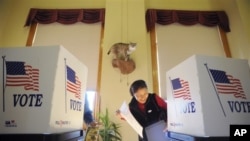As American voters head to the polls, many of the people making their choices have roots in Asian countries.
There are an estimated seven million Asian Americans eligible to vote. Of those, the US Census Bureau 2008 survey said almost four million were registered voters. Paul Ong is a professor of Asian American studies at the University of California at Los Angeles, UCLA.
"I would say that Asian Americans are still somewhat on the margin if you look at it broadly, nationally. They make up at most five percent of the voters," said Ong. "But, in certain areas, they make up a substantial percentage of voters. So in the big urban areas, the Bay Area, Los Angeles, New York, there are essentially electoral districts, congressional districts, local districts where Asian Americans are very influential. They may not be in the majority, but they are swing voters. They can make a difference in those districts."
Professor Ong says to a great degree, which way these Asian Americans vote depends on from where they or their families are from.
"Clearly Southeast Asians lean toward Republicans," noted Ong. "Many of them are political refugees, many of them coming over after the fall of Saigon. Many tend to be anti-Communist. They find within the Republican Party people who share their feelings in terms of their political view. I think you have among Filipinos, Japanese and so forth a sense of past discrimination and that leads them to be more in line with the policies of redress, racial inequality and therefore they lean toward the Democratic Party."
A significant number of Asian American voters, especially from South Asia, are of the Islamic faith. Ahmed Rehab of the Council on American Islamic Relations says American politics over the past decade has led to a shift in Muslim political leanings.
"Before President Bush's first administration, it normally leaned Republican because of the family values," said Rehab. "Since then, with the War on Terror, and the language that came out of that that failed to differentiate between terrorists and Muslims at large, Muslims increasingly felt uncomfortable with the Republican Party especially as the rhetoric continued to be anti-Muslim and started to vote more Democratic. So there's been a shift and increasingly so now with the Tea Party and what not."
What are these voters looking for from their politicians?
"For American Muslims, the biggest concern right now is the quality and tone of the debate," added Rehab. "Whether this debate is on our national security, or our jobs or the economy or even the place of Muslims in America, our concern is that the nature of the debate in America has become more and more divisive, cynical, frenzied, paranoid, and we are very concerned about that and we wish that they debate itself, regardless of the positions people take, to be rooted in more intellect and empirical analysis and honest debate and mutual understanding."
As far as the overall Asian American population is concerned, Mini Timmaraju of the Asian and Pacific Islander American Vote organization says it's pretty much the same as a good portion of all American voters.
"I think it's the economy and jobs," said Timmaraju. "We have data that indicates that, but we also know that's what the vast majority of Americans care about too and I don't think that Asian Americans are any different. They've been hit similarly by the economy and by the (unemployment) rate in the country."
Which leads to the question of whether Asian Americans voters will do what many in the US electorate are expected to do in this election, shift away from the party in power.




